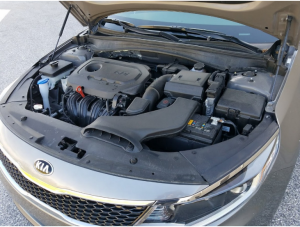If you’re having transmission problems with your Kia, you’re not alone. In fact, it seems like a lot of people are having the same issue.
But don’t worry, we’re here to help. We’ll take a look at the most common transmission problems people are having with their Kias and see what we can do to fix them.
Contents
Kia Transmission Problems: An Overview
Since the early 2000s, Kia has had a number of issues with their automatic transmissions. These problems have been widespread and often expensive to fix. In some cases, they have even resulted in class action lawsuits.
The most common transmission problem is known as the “shuddering” or “stalling” issue. This occurs when the transmission suddenly loses power and the car comes to a stop. This can be very dangerous, especially if it happens while you are driving on the highway.
Other common problems include:
- Transmission slipping
- Gears grinding
- Erratic shifting
- Leaks
Common Kia Transmission Problems
Kia transmission problems can occur at any time. Fortunately, there are a number of common Kia transmission problems that can be easily diagnosed and repaired. The most common Kia transmission problems include:
- Automatic Transmission Won’t Engage or Disengage: This is a very common problem that a variety of factors, including low transmission fluid levels, dirty transmission fluid, worn clutches, or faulty shift solenoids can cause.
- Transmission Slips or Shifts Erratically: This is another common problem that low transmission fluid levels, dirty transmission fluid, worn clutches, or faulty shift solenoids can cause.
- Transmission leaks: This is one of the most common Kia transmission problems and is often caused by a leak in the seals or gaskets.
- Kia check engine light is on: This is often an indication of a problem with the transmission and should be diagnosed by a qualified technician as soon as possible.
- Loud noises from the engine area: This can be caused by a number of factors, including worn bearings, bad synchronizers, or damaged gears.
If you are experiencing any of these Kia transmission problems, it is important to have your car inspected by a qualified technician as soon as possible to avoid further damage to your car’s transmission system.
How to Diagnose Kia Transmission Problems
If you own a Kia vehicle with an automatic transmission, you may eventually have to deal with transmission problems. Though not as common as engine or battery issues, transmission problems can lead to decreased fuel efficiency, strange noises, and a jarring driving experience. If you suspect your Kia’s automatic transmission is having issues, here are four symptoms to look out for.
-
Check the Transmission Fluid Level
First and foremost, you should check the level and condition of your transmission fluid. If the fluid is low or dirty, it could be causing your transmission problems.
You can check the fluid level by opening the hood and removing the dipstick from the transmission fluid reservoir.
If the dipstick shows that the fluid level is low, add more transmission fluid until it reaches the “full” line on the dipstick.

-
Listen for Strange Noises
If you notice strange noises coming from your Kia’s Transmission, it could be a sign of a problem. Common sounds include grinding or whining noises when shifting gears.
These sounds could indicate a worn-out clutch or damaged gears. If you hear any strange noises coming from your car’s transmission, have it checked out by a mechanic as soon as possible.
-
Look for Leaks
Transmission fluid leaks are another common symptom of transmission problems in Kia vehicles.
If you see red or brown fluid underneath your car, it’s likely that your car is leaking transmission fluid.
A leaky gasket or sealing ring may be to blame. Once again, if you notice any leaks coming from your car’s transmission, take it to a mechanic right away so they can fix the problem before it gets worse.
-
Feel for Strange Vibrations
If you feel strange vibrations coming from your car while driving, it could be a sign that your torque converter is going bad. The torque converter is responsible for converting the engine’s rotational energy into hydraulic energy, which powers the automobile’s Transmission. If it’s not working properly, you’ll feel vibrations while driving at high speeds
How to Fix Kia Transmission Problems
If you’re having problems with your Kia’s transmission, there are a few things you can do to try to fix the issue. First, check the transmission fluid level and make sure it’s full. If it’s low, top it off and see if that helps. If the fluid level is fine, then you may need to have the transmission flushed and filled. This will replace all of the old fluid with fresh, new fluid and may help solve your problem. Finally, if you’re still having issues, you may need to take your Kia to a mechanic or dealer for further diagnosis and repair.
How to Prevent Kia Transmission Problems
If you own a Kia, you may have experienced transmission problems. In this article, we’ll show you how to prevent Kia transmission problems.
First, it’s important to understand the basics of how a Kia transmission works. The engine powers the transmission, which then sends power to the wheels. The transmission has a number of gears that it can shift between, depending on the car’s speed.
There are two main types of transmissions: automatic and manual. Automatic transmissions are easier to use, but they’re also more likely to experience problems. Manual transmissions are more difficult to use, but they’re less likely to have problems.
If you’re experiencing Kia transmission problems, there are a few things you can do to try to fix the problem. First, check the fluid level in the transmission. If it’s low, add more fluid. You can also try shifting into lower gear. This will put less strain on the transmission and may help fix the problem.
If these tips don’t fix the problem, you may need to take your car to a mechanic for further diagnosis and repair.
Resources for Further Reading on Kia Transmission Problems
If you are researching Kia transmission problems, you may find the following resources helpful.
The Carcomplaints.com website has a section devoted to transmission problems, where users can search for complaints by car make and model. The NHTSA (National Highway Traffic Safety Administration) website also has a searchable database of complaints, which can be filtered by car make and model. In addition, Consumer Reports has a section on its website devoted to car reliability, which includes ratings for transmission problems.
Kia Transmission Problems
Kia transmission problems have been an issue for drivers of Kia vehicles for years. Some customers have even taken legal action against the company. In this article, we’ll take a look at some of the most common transmission problems with Kia vehicles, as well as some of the steps you can take to avoid them.
One of the most common transmission problems with Kia vehicles is “hard shifting.” This occurs when the transmission has difficulty shifting gears and can cause a jerking motion when accelerating. This problem is often caused by low transmission fluid levels, so it’s important to check your fluid levels regularly. If you notice that your vehicle is hard shifting, take it to a mechanic to have it checked out.
Another common problem with Kia transmissions is “slipping.” This occurs when the transmission slips out of gear while you’re driving, and can be very dangerous. Slipping can be caused by a variety of factors, including low transmission fluid levels, worn Transmission Control Module (TCM) components, or even an issue with the torque converter. If your vehicle begins to slip while you’re driving, take it to a mechanic immediately.
If you own a Kia vehicle with an automatic transmission, it’s important to be aware of the potential for “shuddering.” Shuddering is a vibration that can occur when the torque converter clutch is engaged. It can be caused by a variety of factors, including low transmission fluid levels, dirty transmission fluid, or worn torque converter clutches. If your vehicle shudders when the torque converter clutch is engaged, take it to a mechanic to have it checked out.
In addition to these common problems, there have also been reports of more serious issues with Kia transmissions, including complete failure. In some cases, these failures have resulted in accidents or injuries. If you suspect that your Kia transmission has failed, or if you experience any unusual symptoms while driving, take your vehicle to a mechanic immediately.
There are a few things you can do to help avoid Kia transmission problems:
- Check your fluid levels regularly and top off as needed.
- Keep your Transmission Control Module (TCM) clean and free of debris.
- Inspect your torque converter regularly for signs of wear or damage.
- Have your vehicle serviced regularly by a qualified mechanic
FAQs
Q: What Transmission Problems Have Been Reported for the Kia?
A: The most common transmission problem for Kia vehicles is the failure of the automatic transmission to engage or disengage properly. This can cause the vehicle to jerk or hesitate when shifting gears, and can also lead to premature wear on the transmission. In some cases, the transmission may even fail completely. Other common problems include fluid leaks, slipping gears, and rough shifting.
Q: What Is the Most Likely Cause of Transmission Problems in Kia Vehicles?
A: The most likely cause of transmission problems in Kia vehicles is a failure of the internal parts of the transmission to function properly. This can be caused by a number of things, including manufacturing defects, poor maintenance, or simple wear and tear. In some cases, external factors such as extreme temperatures or road conditions can also contribute to transmission problems.
Q: How Can I Avoid Having Transmission Problems With My Kia?
A: You can avoid transmission problems with your Kia by regularly servicing your vehicle and checking for any signs of trouble. If you do experience any issues with your transmission, be sure to have it checked out by a qualified mechanic as soon as possible to avoid further damage.
Sources
- https://www.kiaofpuyallup.com/blog/how-do-you-know-if-your-kia-vehicles-transmission-is-failing/
- https://www.kiaofanderson.com/blogs/3702/4-signs-your-kia-needs-a-transmission-repair
- https://itstillruns.com/kia-transmission-problems-7724525.html
Related Articles: https://balancedvehicle.com/blog

